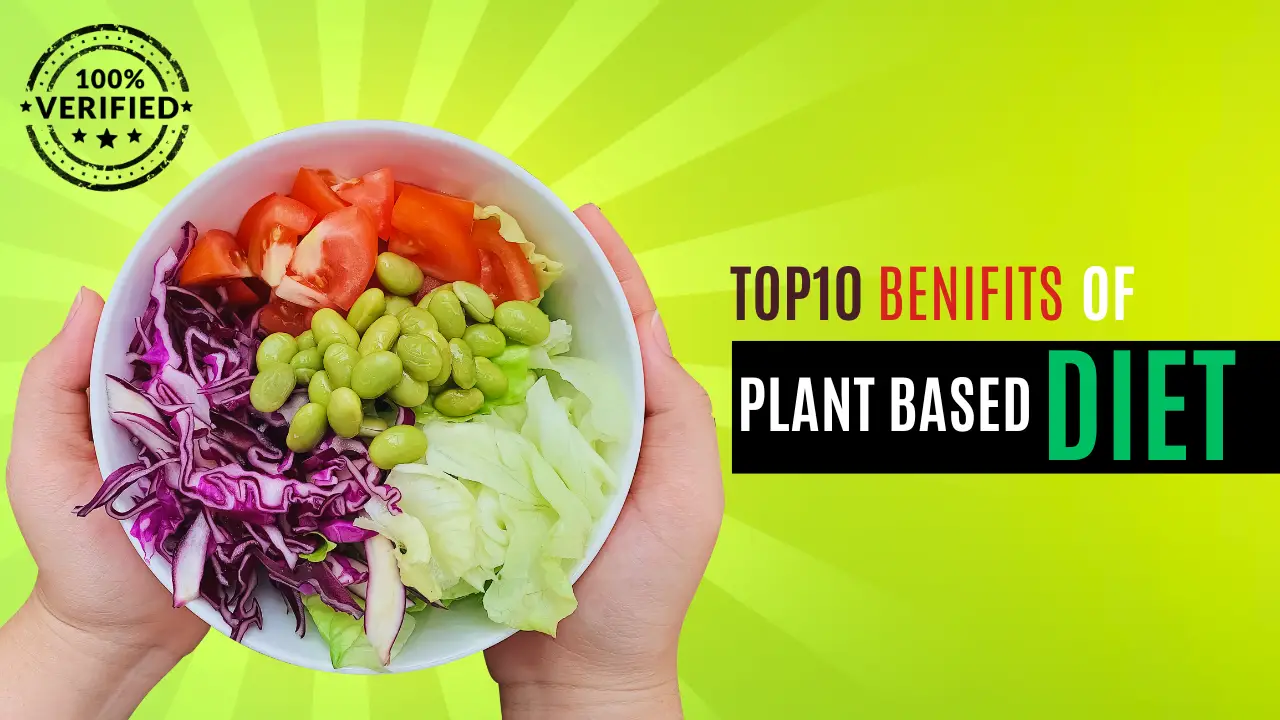The Top 10 Benefits of Adopting a Plant-Based Diet for better health
Table of Contents
Energize your life with a plant-based diet full of joyful benefits. Discover how to stay healthy and happy in a natural way.
Introduction
Eating a plant-based diet has gained popularity in recent years due to its numerous health, environmental, and social benefits. Let’s explore the top 10 advantages of incorporating plant-based foods into your daily meals.
Improved Nutritional Intake
- Increased intake of essential vitamins and minerals
- Lower intake of saturated fats and cholesterol
- Better digestion and absorption of nutrients
Health Benefits of Plant-based diet
Lower Risk of Chronic Diseases

- Reduced risk of heart disease and stroke
- Lower incidence of type 2 diabetes
- Decreased risk of certain cancers
Weight Management

- Easier weight maintenance
- Increased metabolism and energy levels
- Reduced body fat percentage
Improved Gut Health
- Increased fiber intake promotes healthy gut bacteria
- Reduced risk of digestive issues like constipation
- Improved overall gastrointestinal function
Environmental Impact
Reduced Water Usage
- Lower water consumption for plant-based food production
- Decreased strain on water resources
- Positive impact on global water sustainability
Lower Carbon Footprint

- Reduced greenhouse gas emissions
- Decreased deforestation for animal agriculture
- Contribution to combatting climate change
Biodiversity Preservation
- Conservation of diverse ecosystems
- Protection of wildlife habitats
- Promotion of species diversity
Economic Benefits
Cost-Effective
- Lower grocery bills compared to animal-based diets
- Reduced healthcare costs from preventable diseases
- Long-term savings on medical expenses
Sustainable Food Production

- Increased efficiency in plant-based farming
- Less demand for resources compared to animal agriculture
- Long-term sustainability of food supply
Support for Local Farmers
- Promotion of small-scale agriculture
- Increased demand for local, organic produce
- Strengthening of communities through local food markets
Social Benefits
Compassionate Food Choices
- Ethical treatment of animals in food production
- Reduction of harm to living beings
- Advocacy for animal rights
Inclusivity and Diversity
- Adaptability of plant-based diets for different cultures
- Promotion of cultural variety through plant-based cuisine
- Inclusion of diverse dietary preferences and restrictions
Promotion of Wellness
- Encouragement of overall well-being through healthy eating
- Fostering of positive lifestyle choices
- Creation of supportive community networks
Conclusion
In conclusion, adopting a plant-based diet offers numerous benefits for individuals, the environment, and society as a whole. By prioritizing health, sustainability, and compassion in food choices, one can contribute to a more wholesome and nourishing lifestyle.
FAQs
Can I get enough protein on a plant-based diet?
- Yes, it’s entirely possible to obtain sufficient protein from plant-based sources such as legumes, tofu, tempeh, nuts, seeds, and grains. With proper planning, you can meet your daily protein requirements without relying on animal products.
How can I ensure I am meeting all my nutritional needs without animal products?
- By incorporating a variety of nutrient-rich plant foods into your diet, you can ensure you’re meeting all your nutritional needs. Focus on consuming a diverse array of fruits, vegetables, whole grains, legumes, nuts, and seeds to obtain essential vitamins, minerals, and other nutrients.
Are there any potential drawbacks to transitioning to a plant-based diet?
- While plant-based diets offer numerous health benefits, there are potential drawbacks to consider, especially during the transition phase. These may include possible nutritional deficiencies if not planned properly, digestive changes due to increased fiber intake, and social or practical challenges when dining out or navigating social situations. However, with proper planning and support, these challenges can be overcome.
What are some good sources of iron on a plant-based diet?
- Plant-based sources of iron include lentils, chickpeas, tofu, spinach, quinoa, fortified cereals, pumpkin seeds, and dried apricots. Consuming these foods regularly can help prevent iron deficiency anemia.
Is it necessary to take supplements on a plant-based diet?
- While it’s possible to obtain all necessary nutrients from a well-planned plant-based diet, certain supplements may be beneficial, especially for nutrients that are more challenging to obtain from plant sources, such as vitamin B12 and omega-3 fatty acids. Consulting with a healthcare professional or registered dietitian can help determine if supplementation is necessary based on individual needs and dietary habits.
Share this content:






Post Comment